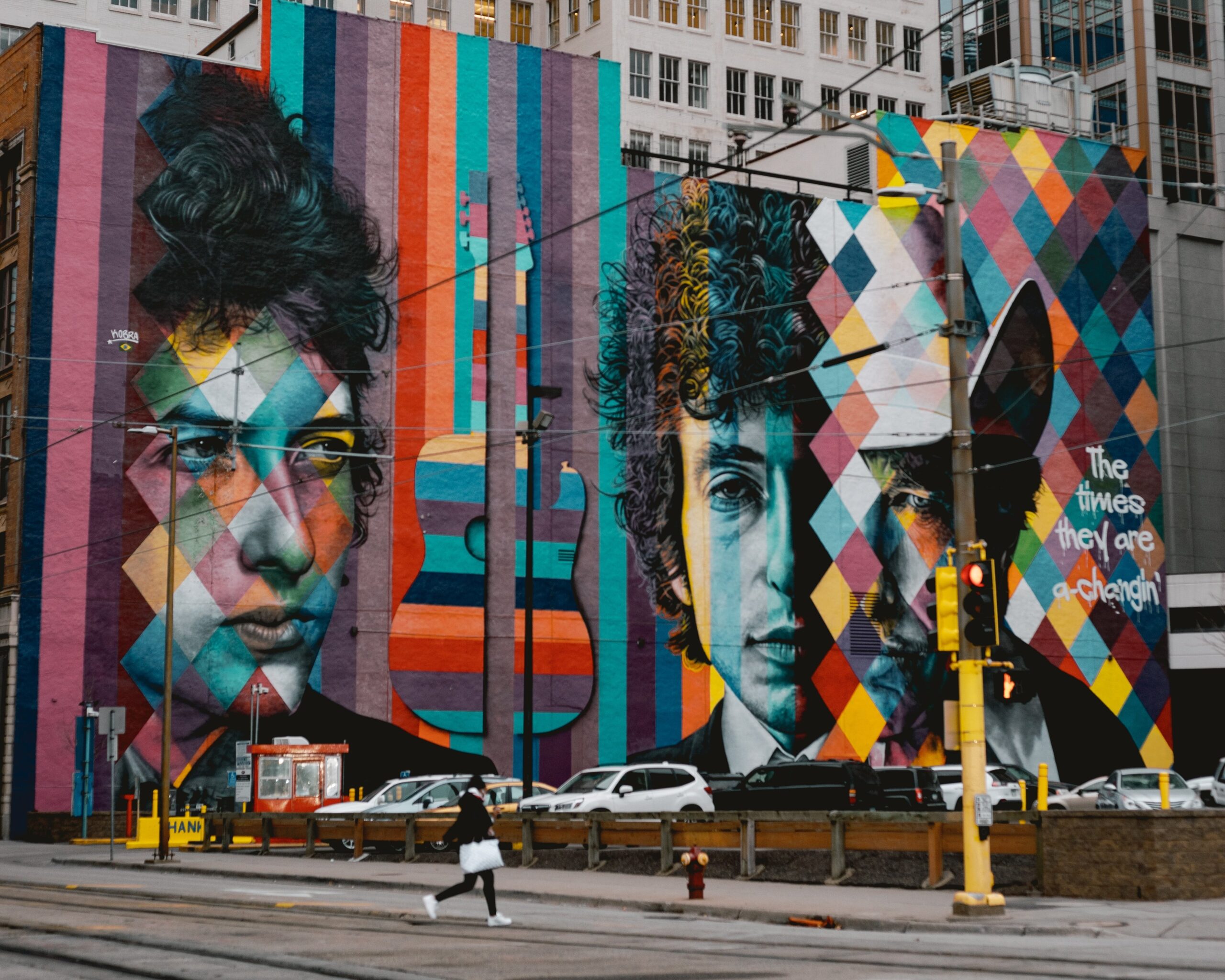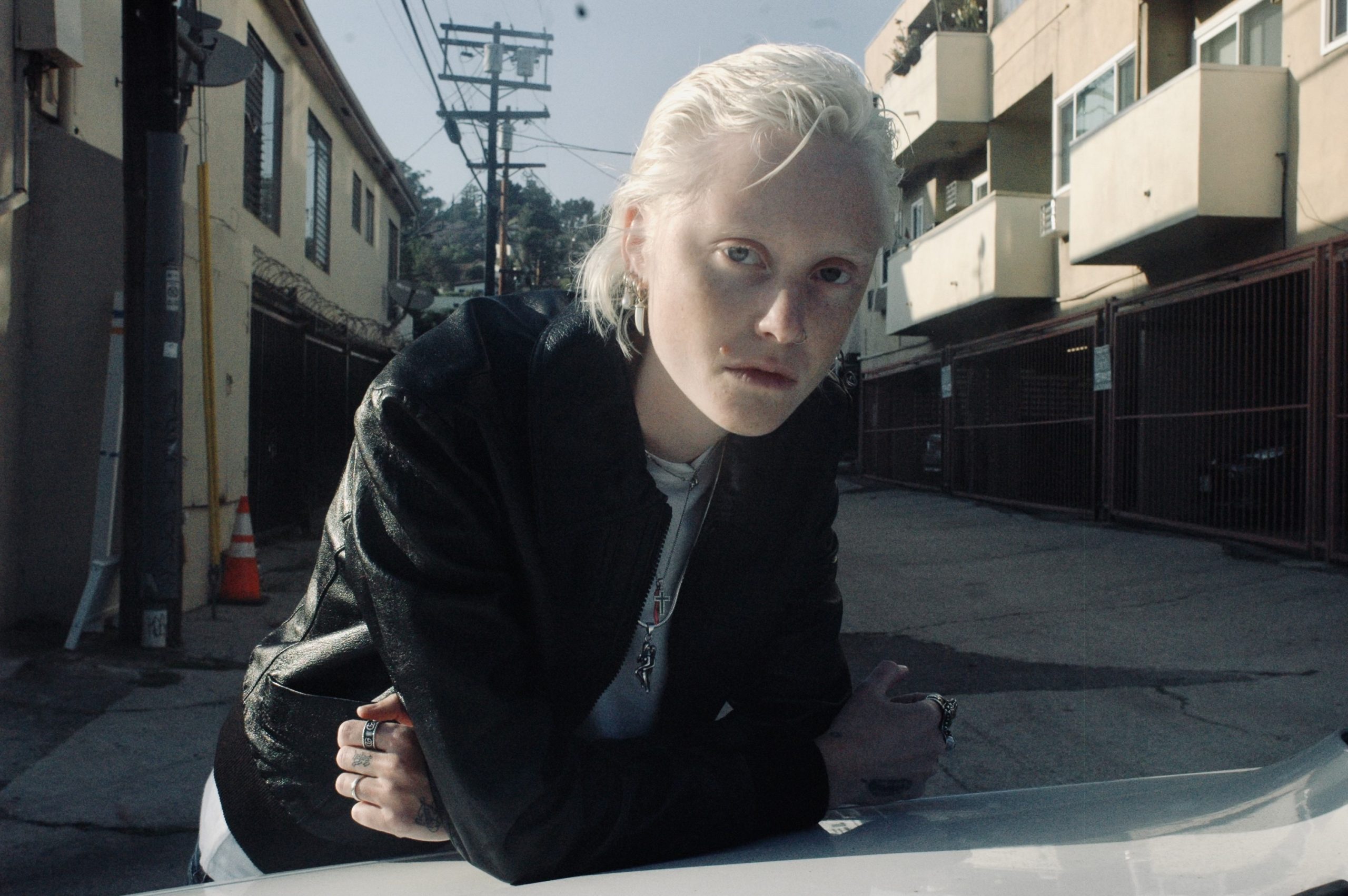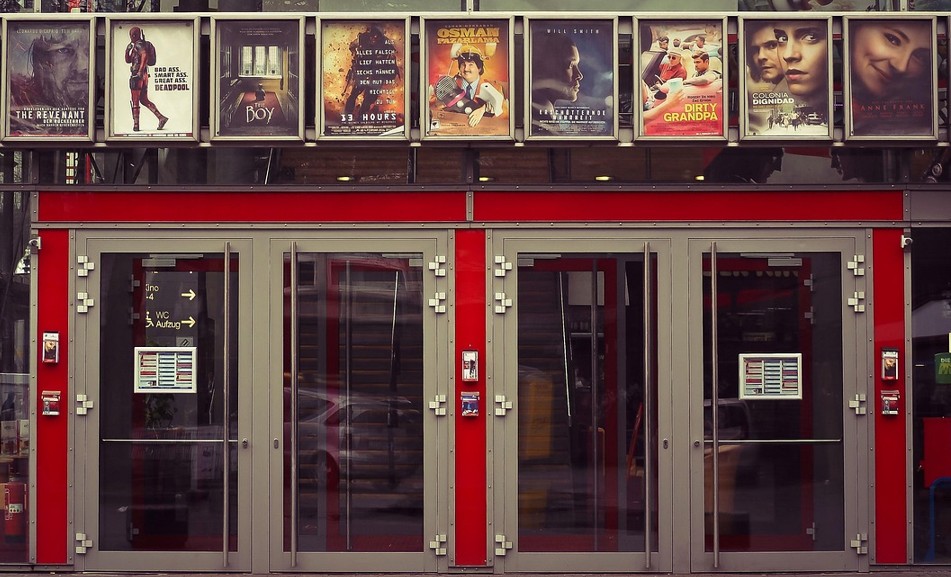Music
Bob Dylan and Phoebe Bridgers’ American Nightmares: Twin Talents, Generations Apart
24 Jun, 20

Bob Dylan - 5th Street, Minneapolis, MN
Photo by Weston M - Unsplash
Bob Dylan and Phoebe Bridgers each released albums this week.
Dylan is a legendary 79-year-old folk singer, while Bridgers is a rising 25-year-old indie rock musician. But both have an eerie knack for describing how it feels to live in America during these peculiar times.
Bridgers is a fan of Dylan. After his album dropped, she tweeted, “honestly…bob dylan is sick.” She’s also compared herself to Dylan, telling The Guardian that “at 12 or 13 I was just like, I’m the next Bob Dylan.” That statement would sound insane if it wasn’t arguably true.
Twin Talents, a Generation or Two Apart
Phoebe Bridgers’ sophomore album Punisher is an often tongue-in-cheek, dismal, and fanciful dream-folk-rock album, filled with references to everything from UFOs and chemtrails to depression and the occasional Nazi-killing.
Dylan’s Rough and Rowdy Ways is characteristically enigmatic, but it expresses a similar fascination and disgust with America and the mythologies that uphold it.
There are some objective similarities between Bridgers and Dylan. They both have a penchant for wry observations, and on their most recent albums they both surround their folk roots with various musical styles (blues in Dylan’s case, classical and rock in Bridgers’), which stretch out like clouds around their Americana cores.
They both pepper their more impressionistic pieces with jarring references to violence (dismemberment and murderers are frequent subjects), but tenderness shows up just as often. Capable of zeroing in on tiny events and then zooming out to galaxy-brain-esque overviews, both artists are uncannily capable of capturing the funhouse mirror vertigo of being alive.
But the deeper similarities between Bridgers and Dylan can be found on a more intangible plane, beyond genre—in that sublime, separate world where creativity exists in its perfect form, and in the twin prongs of despair and longing that fuel their desire to go there.
Visions of A World Beyond Longing: “I Know the End” and “Key West (Philosopher Pirate)”
Their similarities come to the fore in the final/penultimate songs on their albums, which happen to both be epic knockouts. Side A of Dylan’s Rough and Rowdy Ways ends with “Key West (Philosopher Pirate),” an accordion-laden tribute to death or spiritual transcendence, both to be found under Florida palms.
It’s one of those songs that sounds capable of flying—and that seems to contain the entire human experience inside of it, as well as a hint of the greater divine force that connects us to all things.
The same could be said of Bridgers’ song “I Know the End,” which is Punisher’s jaw-dropping closer. Complete with a time-change and an exhilarating buildup ending with Bridgers’ screams, it’s thoroughly unhinged.
Halfway through “I Know the End,” Bridgers launches into an outro with lyrics that could be described as Dylan-like. “A slaughterhouse, an outlet mall, Slot machines, fear of God. Windows down, heater on, Big bolts of lightning hanging low,” Bridgers sings. She paints an image of a lonely nation, lost in its own consumerist fantasies, clinging tightly to glittery delusions of redemption as the world burns. “Over the coast, everyone’s convinced, It’s a government drone or alien spaceship. Either way, we’re not alone,” she sings, weary yet captivated by the world’s slow collapse.
Dylan’s “Key West (Philosopher Pirate)” is also defined by a sense of finality, bound up with both reverence and distaste for American myths. It’s also a behemoth of a song: “a poignant 9-minute accordion noir about an old desperado heading off to Florida to make his last stand, brooding over the end times, with only his radio as a reminder of the life he left behind,” writes Rob Sheffield for Rolling Stone.
In both songs, and on both of their albums, the singers seem aware that they’re headed somewhere—towards redemption or death or maybe some combination of both. That something is growing more real than the real worlds before them.
“Three miles north of purgatory — one step from the great beyond/I prayed to the cross and I kissed the girls and I crossed the Rubicon,” sings Dylan on “Crossing the Rubicon.” It’s a journey that resembles Bridgers’ search for a “creation myth,” which leaves her with nothing but a “pair of cracked lips.”
Bob Dylan – Crossing the Rubicon (Official Audio)www.youtube.com
In both songs, religion is insufficient, and there is no remedy for mortality. But music is a rare source of hope, one of the few things that continues to exist in times of collapse and loneliness. “For Dylan, the only vision of America that still makes sense is a swirl of half-remembered songs across the radio dial, long after midnight,” continues Sheffield.
Ghosts, Revelations, and the American Tradition of Making Music Out of Reckonings
Neither artist is deluded enough to believe they’re the first to experience “the end,” and neither wallows in any form of nostalgia for America’s past. Instead, they’re both in constant conversation with the ghosts of those who come before them, and they consult with these ghosts as they prepare to become ghosts themselves. Dylan’s “Key West” pays direct tribute to several dead Beatniks—Corso, Ginsberg, Kerouac, all fallen symbols of a counterculture revolution that never entirely materialized.
All of Bridgers’ music is also haunted by ghosts (namely those of Eliott Smith or her own childhood). She’s also prepared to become one. “I’ll find a house with a picket fence / to float around and ghost my friends,” she sings on “I Know the End.” (Somehow it’s easy to imagine that Bob Dylan was ghosting people before cell phones were invented).
For both artists, music is a medium between this world and the next, and both artists walk the seams between this world and whatever a post-revelation future might hold.
Many religions have their own billboard-ready versions of the revelation—the moment when the sky falls apart, the gods descend, the meek are saved, and judgement is finally served. With his depictions of Key West, Dylan subverts these revelations, envisioning “the end” as a heavenly place where sins are absolved, an escape from the world of forced marriages, trauma, silence, and lies that he so deftly describes.
The same goes for Bridgers’ apocalyptic visions. “The billboard said / the end is near,” she sings as the music grows louder. It’s a joyful moment, a kind of exorcism offering a sense of catharsis and release.
Neither song frames “the end” as a final stopping point. Instead, “the end” seems to mean the world is on the brink of a great change, some kind of cosmic shift or evolution. Dylan, for one, is prepared to wait out the end among the palm trees of Key West. “Key West is the place to be / If you’re looking for immortality / Key West is paradise divine / Key West is fine and fair / If you lost your mind, you’ll find it there / Key West is on the horizon line,” he sings. “The apocalypse,” in Dylan’s mind, may be a catalyst for a better world. To get there, of course, we’ll have to keep rambling through this one.
Music for a Plague-Ridden, Changing World
That both songs were released during a pandemic has only made their messages more relevant. Recent events like the killing of George Floyd make the artists’ open disdain for American mythologies feel more pressing and urgent.
After all, strange fireworks are erupting across American cities. The president is holding dangerous rallies. The world is reeling from the death of George Floyd, and America is reckoning with its past and present as more stories about more police killings fill the headlines. The pandemic continues to ravage the nation.
There’s a heady sense of panic and transformation in the air, which both artists capture in their music. Both have been outspoken about Black Lives Matter movement—Bridgers accompanied her album release with the statement “abolish the police,” and Dylan’s been singing about racial profiling since the 1960s.
True to form, their music attacks American mythology at its roots, and maybe these songs are so heavy because the pain described is so old and so deeply embedded. But the pain isn’t stagnant. It can be transmuted, they seem to say. It has an end.
Dylan and Bridgers are each on highways going towards some catastrophic, gleaming, revelatory end—we all are. Fortunately, we have great songwriters to accompany us on the journey.













